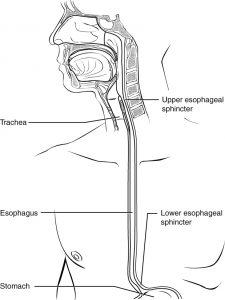What Is Eosinophilic Esophagitis?
 Eosinophilic Esophagitis (EoE) is an inflammatory disorder of the esophagus. Eosinophils are white blood cells that are active in multiple inflammatory and allergic disorders. In EoE, eosinophils travel to the esophagus where they are not normally present. Chronic inflammation of the esophagus leads to a variety of symptoms, including trouble swallowing (dysphagia), abdominal pain, heartburn, failure to thrive in children, and vomiting.
Eosinophilic Esophagitis (EoE) is an inflammatory disorder of the esophagus. Eosinophils are white blood cells that are active in multiple inflammatory and allergic disorders. In EoE, eosinophils travel to the esophagus where they are not normally present. Chronic inflammation of the esophagus leads to a variety of symptoms, including trouble swallowing (dysphagia), abdominal pain, heartburn, failure to thrive in children, and vomiting.
EoE may present at any age. Children are more likely to present with vomiting or abdominal pain. Adults are more likely to complain of dysphagia or heartburn. Most patients with EoE have another allergic disorder in their medical history or in their family history, such as asthma, allergic rhinitis, eczema, or food allergy.
EoE can be diagnosed by a biopsy of the esophagus showing high eosinophils. EoE is not the only condition causing eosinophils in the esophagus, but it tends to cause higher numbers than other disorders. There are also other features unique to EoE that may be observed by scope or biopsy, lending confidence to the diagnosis.
The relationship between food allergy and EoE is complex. For many patients with EoE, identification of a food allergen, and removal of that food from the diet, will reverse the disease. The food reactions in EoE, however, can be a delayed type of reaction, making the food(s) difficult to identify. Airborne allergens, such as dust mite, pollen, and mold, can play a role when they are swallowed and enter the esophagus. An allergist will determine what testing is indicated for each situation. Evaluation may include skin testing, blood testing, elimination diets, elemental diet, and/or food trials.
Medication provides relief for some patients. Proton-pump inhibitors, commonly known as acid-reducers, are used. EoE is not an acid-related disease, but is believed to respond to an anti-inflammatory property of the medication. Topical steroids may be used and can push the disease into remission. The steroid is swallowed from either an asthma inhaler or prepared mixture.
The evaluation and care of EoE are unique to each patient. If you suspect you have EoE, or have already been diagnosed, an allergist can determine the role of food allergy in your condition and your treatment options. To schedule an appointment, call our office at 309 452-0995 or 217-717-4404.
We always have an on-going paid clinical trials for interested patients. Please visit our clinical trials page to see if you are eligible and would like to participate in the program to get close care from your provider and benefit research.
Read “Top 11 FAQs about EoE”.
Learn more about The Relationship Between EoE and Asthma.


